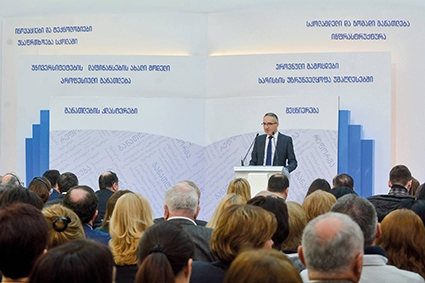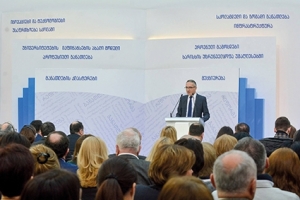Complex Education Reform to Be Launched in Georgia
Mikheil Batiashvili, Minister of Education, Science, Culture and Sport of Georgia, held a summarizing presentation of the Education System Complex Reform.
The reform implies a number of changes to the education system and includes changes in the pre-school, secondary, vocational, higher education and science areas, with Georgian experts and education subject-matter specialists actively engaged in the reform design and development process.
International organizations the United States Agency for International Development (USAID), World Bank, International Monetary Fund (IMF), Asian Development Bank (ADB) and almost all donor agencies and international partners of Georgia also participated in forming the upcoming strategy.
Within the framework of the education reform, the School Readiness Program will be provided for all children of Georgia for 2021-2023.
In addition, new educational programs and resources will be introduced based on the principles of inclusive and civil education. A new model of teacher certification and salary policy is to be developed and approved.
In the field of general education, a New School Model has been created based on literacy, which is focused on critical thinking and fast adaptation to the environment, based on the general skills of the students.
The model also envisages providing schools with autonomy and decentralization: moving from a uniform approach to differentiated approaches and the development of the principals as strong leaders.
The New School Model was successfully implemented in Public School 150 of Tbilisi and by 2024, the model will be introduced in all schools throughout the country.
It was announced by the Education Ministry that School Graduation Exams will be abolished from 2020. Other major changes will be enacted in the education system from the same year. Prior to that, in 2019, 11th graders will be exempted from graduation exams, but these exams will be retained for 12th grade students.
It was stated that National Examinations will be conducted in three compulsory subjects instead of four from 2020. Georgian Language and Literature and foreign language exams will remain mandatory for all university entrants. Entrants will still be able to choose from technical and humanitarian programs, but the third compulsory subject will be determined according to the demands of the higher educational institutions the entrants wish to join.
Passing a General Skills exam will no longer be compulsory, but universities will have the right to add a selective examination relevant to their own program, including a General Skills exam.
Batiashvili stated that in 2019, the construction of nine new public schools in Tbilisi and in the regions, and the renovation of 265 public schools, will be completed.
“Eight special schools will be renewed and the construction of 35 new schools will be launched. We want to build a city of education and science which will unite different educational spaces,” he noted.
In the field of higher education, the goal is to integrate into the international education space and instigate quality improvement. Moreover, the Development Strategy implies the transformation of Georgia into a regional hub for international business, tourism, transport and education.
Vocational Education and Life-Long Learning is one of the priority areas of the presented reform. The Minister said the government is introducing a system which will help individuals of any age to adapt to the fast changing world, acquire new professional skills, and enjoy self-realization and development.
In terms of science, the reform implies integration into the international scientific space and increased funding for science.
The overall aim is to develop Georgia’s human capital, generating competitive professionals equipped with advanced knowledge and skills, oriented towards long-term development.
“The modern world, new technologies and fast pace of changes requires humans to have new, diverse skills, the ability to process information and quickly respond to problems, and apply logical thinking. The methodology of the education sector reform and new approaches envisage a system that zooms in to an individual child, adolescent, youth and teacher,” he stated.
PM Bakhtadze thanked all sides involved in the reform development process and expressed confidence that the reform will be successful.
“We will have competitive generations equipped with advanced knowledge who will make their due contribution to the democratic and economic transformation of Georgia. That is how we will overcome poverty, reach welfare and join a group of advanced, developed countries by succeeding in the creation of a unified, strong and European state,” he added.
By Thea Morrison
Image source: mes.gov.ge












